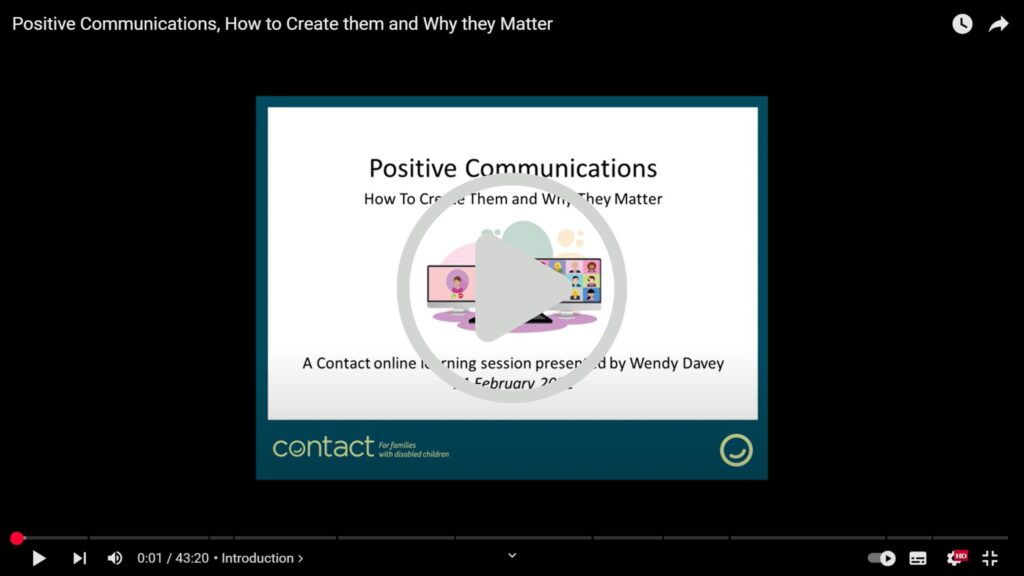The use of social media and networking sites is growing. More people than even before are using them as a communication tool. The use of social media provides many opportunities to improve the way parent carer forums communicate, reach out and interact with people and other groups.
Forums may choose to use social media for a variety of reason including:
- Accessibility: Many parent carers are active on social media platforms, making it an easily accessible way to reach them. It allows forums to connect with a broader audience, including those who may not attend in-person meetings or access other communication channels regularly.
- Timeliness: Social media enables forums to share updates, news, and important information in real-time. This ensures that members stay informed about relevant issues, events, and developments as they happen.
- Community Building: Social media platforms provide forums with an opportunity to build a sense of community among parent carers. It allows members to connect with each other, share experiences, offer support, and build relationships beyond traditional meetings or events, at times convenient to them.
- Feedback and Input: Social media enables two-way communication, allowing forums to gather feedback, opinions, and input from their members easily. This feedback can be valuable for shaping the forum’s activities, priorities, and representation efforts.
- Awareness: By using social media, parent carer forums can raise awareness about the challenges and needs of parent carers and drive positive change. They can amplify their voices, share stories, and engage with a wider audience, including policymakers, service providers, and the general public.
Overall, social media platforms offer parent carer forums a powerful and effective means to engage with their members, build community, raise, and collate the issues that matter to them.
By following the tips below, forums can effectively use social media platforms to engage with parent carers, raise awareness, and provide valuable information, signposting, and resources.
- Know Your Audience: Understand the interests, needs, and preferences of parent carers in your area. Tailor your content and messaging to be meaningful to them.
- Choose the Right Platforms: Focus on the social media platforms where parent carers are most active. For parent carers, platforms like Facebook, Instagram, and X (formerly Twitter) may be particularly relevant.
- Consistent Branding: Maintain consistency in branding across all social media platforms. Use the same logo, colours, and messaging to create a consistent and recognisable presence.
- Engaging Content: Share content that is relevant, informative, and engaging for parent carers. As well as the work you do, this could include educational resources, personal stories, tips, guidance, signposting, and updates about relevant events, training, or developments.
- Visual Appeal: Use compelling visuals such as images, videos, and infographics to capture attention and get your message across effectively. Visual content tends to work better and is more likely to be shared by users.
- Interactive Engagement: Encourage interaction and participation from your audience. Ask questions, run polls, host live Q&A sessions, and respond as promptly as you can to comments, messages, and enquiries.
- Community Building: Build a sense of community among parent carers by creating opportunities for them to connect, share experiences, offer support, and engage with one another. Some forums have set up closed groups to support parent carers in a safe place to connect, rather than a public page.
- Use Hashtags: Where appropriate, use relevant hashtags in your posts to increase visibility and reach a wider audience. Research popular hashtags, related to parent carers and special educational needs and disabilities (SEND), to generate interest in your posts.
- Monitor and Analyse: Regularly monitor the performance of your social media efforts using analytics tools provided by the platforms. Pay attention to metrics, such as engagement, reach, and follower growth, to assess what content most interests your audience. Some social media pages also tell when your page is most active so you can target posts at this time.
- Collaborate and Network: Partner with other organisations, groups, influencers, and stakeholders in the parent carer community to expand your reach and promote each other’s networks.
- Stay Informed: Stay up to date with trends, news, and developments related to parent carers and SEND issues. Share timely and relevant information to demonstrate the forum’s credibility and relevance.
Social media and managing the risks
While these technologies provide exciting opportunities, they are accompanied by dangers and negative consequences, if abused by users.
Managing this can sometime be challenging for forums, as can managing groups on Facebook, WhatsApp or other platforms. But there are several ways that forums can try to address these issues:
Active Moderation: Assign dedicated moderators or administrators who actively monitor the group for disruptive behaviour, inappropriate language, or content, or breaches of group rules including what individuals may perceive to be bullying, intimidation or personal insults. It is helpful to intervene promptly, remove any offensive posts or comments, take any action on sanctions, and address any conflicts that arise. If this isn’t possible due to capacity, it’s worth considering the option to turn off comments or other functions of the group. Many platforms allow the forum to act as a moderator. Using this option can protect individuals from being personally targeted.
Empower and model: Provide guidance to members on appropriate online behaviour and communication etiquette. Encourage constructive dialogue, empathy, and mutual respect among group members and model this in your own interactions and posts.
Private Messaging and Reporting: Enable features such as private messaging and reporting tools within the Facebook group, allowing members to address concerns privately or report disruptive behaviour directly to moderators or administrators. Or provide an alternative and transparent process for members to raise issues, such as email.
Regular Engagement and Discussion: Encourage a positive and supportive community atmosphere by sharing regular posts, discussions, and signposting to relevant information and resources. Create opportunities for members to connect, offer support, and collaborate on common issues.
Conflict Resolution Procedures: Develop clear procedures for resolving conflicts and addressing grievances within the group. Encourage members to resolve disagreements respectfully and privately, escalating to moderators or administrators if necessary.
Transparency and Accountability: Maintain transparency in group management practices and decision-making processes. Communicate openly with members about any changes, updates, or actions taken to address disruptive behaviour.
Member Empowerment: Empower group members to take an active role in maintaining a positive community environment. Encourage them to report anything that breaches the groups rules, provide feedback on group dynamics, and contribute to ongoing efforts to improve the group’s functioning.
Clear Group Rules and Guidelines: Establish clear and concise rules for the Facebook group outlining expected behaviour, respectful communication standards, and the consequences/sanctions for breaking the rules, which might include removal from the group for repeated breaches of the rules. Make sure all members are aware of, and agree to, these rules and guidelines at the point of signing up.
Aim – We want this group to be a fun and safe place to come and talk to people with a shared experience. Please feel free to share any resources that may be of use to the group.
Respect that individuals should have the right to response – Please keep any comments about services constructive and do not name professionals. We appreciate some negative experiences happen and encourage you to follow those organisations procedures to try to find a solution.
Abusive language – We do not tolerate abusive language or swearing in posts or their comments. Any such posts/comments will be removed. Articles shared containing abusive language will likewise be removed.
Respect everyone’s privacy – Being part of this group requires mutual trust. Authentic, expressive discussions make groups great but may also be sensitive and private. What’s shared in the group should stay in the group unless you have informed consent to share. If you have any concern, please contact the admin.
Surveys and feedback – If you wish to use information within the group to collect experiences or views please ensure you advise of this in the original post including the purpose for which it will be used.
By using these strategies, parent carer forums can effectively manage disruption in their Facebook groups while maintaining a supportive and inclusive online community for parent carers.
Staying safe and looking after your wellbeing
Parent carer moderators of Facebook groups can take several steps to stay safe online and look after their wellbeing:
- Set Boundaries: Establish clear boundaries for your online activity, including designated times for moderating the group. It’s essential to strike a balance between your online responsibilities and personal time.
- Protect Personal Information: Avoid sharing sensitive personal information online, such as your home address or phone number. Use privacy settings to control who can see your profile and limit access to personal details.
- Use Secure Passwords: Ensure that your Facebook (and other) account(s) has a strong, unique password to prevent unauthorised access. Consider enabling two-factor authentication for an extra layer of security.
- Verify Members: Be cautious when approving new members to the group. Verify their identities if necessary and monitor for suspicious or inappropriate behaviour.
- Stay Vigilant: Keep an eye out for phishing scams, malware, or other online threats. Be wary of clicking on suspicious links or downloading files from unknown sources.
- Practice Self-Care: Take regular breaks from moderating the group to avoid burnout and maintain your mental and emotional wellbeing. Engage in activities that help you relax and recharge.
- Seek Support: Don’t hesitate to reach out to fellow moderators, the forum’s steering group or trusted friends for support and advice. Sharing your experiences and challenges can help alleviate stress and provide perspective.
- Address Conflict Constructively: Handle conflicts or disagreements within the group calmly and respectfully. Avoid getting drawn into heated arguments or personal attacks, and as a rule of thumb only write anything about a person that you would be happy for them to read.
- Report Abuse: If you encounter harassment, bullying, or other forms of abuse in the group, take appropriate action by removing the offending content, following the forum’s rules re sanctions, and reporting the user to Facebook.
- Stay Informed: Stay updated on Facebook’s community guidelines and policies to ensure that your group complies with the platform’s rules. This can help prevent issues and maintain a positive community atmosphere.
By prioritising their safety and wellbeing, parent carer moderators can effectively manage their Facebook groups while encouraging a supportive and inclusive online community.
Forums can help to protect them by having the correct policies and processes in place to manage social media. Forums would benefit from adopting a social media policy, GDPR policy, and Bullying and Harassment policy, which outlines how they manage social media platforms and the expectations from those using them.
Sources of support and resources
Forums can talk to their Contact adviser if they have any concerns about social media. You may also want to look at the section on Running a Parent Carer Forum for template policies which may be helpful.
If you are experiencing any challenges via social media, then look at the sections on Managing difficult situations and Support for forums.
Below is a list of websites you may find useful.
Do you have any thoughts about this page? Visit our How to feedback page to share them.
Looking for something else? You can find a full list of pages on our Parent carer forum handbook contents page.
Related content

Policies and Procedures
Find more information and downloadable templates for policies and procedures.
Read more
Managing difficult situations
View list of all chapters.
Read more
CIC Assistance Programme
The CIC assistance programme is designed to help forums to carry out their role while maintaining their wellbeing.
Read moreHelpful videos

Positive communications
Find out how upbeat messages about the work of a forum are a great way to evidence achievements.
Watch video
Presenting your forum
Click here to watch this video on our YouTube channel
Watch video
Using social media responsibly
Click here to watch this video on our YouTube channel
Watch video